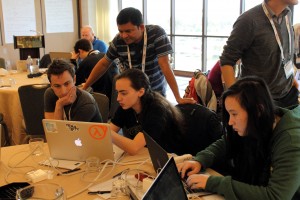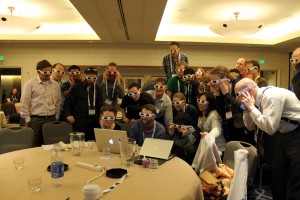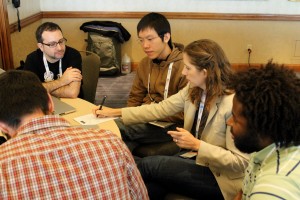This is a guest post by Brooke Simmons, a postdoc at the University of Oxford, where she works on black holes, galaxies, and the Zooniverse.
 Hack days have been around for years in pure programming circles, but last year at the .Astronomy conference was the first time I heard the phrase used in the context of astronomy. I’m still not sure how many astronomers have heard of them, but it’s probably safe to assume many haven’t, so best to start with the basics: a definition.
Hack days have been around for years in pure programming circles, but last year at the .Astronomy conference was the first time I heard the phrase used in the context of astronomy. I’m still not sure how many astronomers have heard of them, but it’s probably safe to assume many haven’t, so best to start with the basics: a definition.
A hack day is a pre-arranged event bringing together ideas, skills, and focus. Not everyone attending a hack day has to have all three of those things (you don’t have to be a programmer), but it probably works best if everyone has at least two. A good hack day has a mix of people with a variety of ideas and a mix of skills, all of whom are committed to spending the day working (and often learning) collaboratively. And the first AAS Hack day (photos) was definitely a good one. Here’s why, in my opinion:
Ideas
Hack Day projects were proposed in several different ways. A couple weeks in advance, people posted on the AAS Hack Day Wiki page and then we switched to marker on poster board in the poster hall on Tuesday and Wednesday. On the hack day itself (Thursday), we started with brief, informal pitches for hacks. A small sample (a full list is at the end of this post; quotes are approximate):
- J. Vasel: “Politicians have to be reminded that science is important, but astronomers don’t usually know when politicians are discussing space-related legislation. This information is publicly available, but not that easy to find. I want to build a website that pulls the space-related items from the schedule on Capitol Hill and makes it easier to digest.”
- N. Gugliucci: “I am recording people giving short summaries of their research for a public audience for a video called ‘AAS: Behind the Science.’ If you want in, let’s go record!”
- E. Lovegrove: “I’ve been working on PYRO, a python-based observing run planner. I have some of it working on the command line but there are other features I want to add, plus I want it to run with a GUI and I’d like help with that part.”
- K. Cooksey: “I just moved and have a long commute. It would be great if I could listen to the day’s arXiv postings on my way in to work. Can we make arXiv into a podcast?”
- E. Rice: “I’m making a parody video called Fund Me Maybe. I have the lyrics written and someone to record the audio, but we need astronomers to film and maybe sing about their science. I’d also welcome expert help putting the video together.”
- D. Finkbeiner: “It would be very useful for me to be able to look at big image files like the WISE sky on the web or in World Wide Telescope, and be able to change the stretch and contrast on the fly.”
During this, people would occasionally call out from across the room that they could help, questions flew back and forth, and D. W. Hogg presided, keeping notes on a big whiteboard.
Skills
After the pitches, a bit of musical chairs allowed those with cross-relevant ideas and skills to meet and commence hacking. J. Fay was at my table during pitches, but moved over to Finkbeiner’s to get to work on hacking WWT. Multiple people gathered, pondered and experimented with the best way to get text-to-speech to make sense of arXiv. The Fund Me Maybe crew moved out of the main hack room to practice singing along to the iPad-turned-teleprompter and plan the recording trip to the poster hall.
One of the best things about a hack day is the extended period of just letting hackers hack: I mostly pair-coded with K. Willett on implementing an improved version of Ned Wright’s Cosmology Calculator on the web.
Focus
The booked-but-open nature of hack day is perhaps the most obvious thing that separates it from any other set of collaborative projects: it works best when the participants commit to the whole day. Thankfully, that’s not too hard given the combination of self-selection and the variety of available hacks. It’s usually the kind of “work” you look forward to.
It also tends to work best when the focus extends to picking a project and sticking with it until it (or the day) is done. Flitting between projects is a great way to meet a lot of people, but it’s often not the best way to make a meaningful contribution.
My Hack Day
That last paragraph requires me to confess: I’m a hypocrite. At the beginning of the day, I wanted to finish the improved CosmoCalc and join in on Fund Me Maybe and record a segment for the public science video. I knew that was a bit unrealistic, but what can I say? Hack day is a day for optimism… and, in my case at #hackAAS, for letting other people take the lead. I helped with a few science lyrics and recorded a verse for Fund Me Maybe, but then I stepped away while the rest of the crew did most of the work so I could (shout “hey, did you guys eat all the pizza?” at the busy, focused hackers in the main room and) assist with the problem of getting a copy-to-clipboard button to work when most browsers consider that a big security risk so try to prevent it. I’m not sure if my contribution to the Behind the Science video even counts, since we recorded it in one take after the wrap-up, so it took less than 2 minutes of my time and technically the day was already over.
The Wrap-up
Then again, even if I bent the non-rules, it was still great fun and a very successful day overall. We gathered again before the closing reception to talk about how it all went. An updated summary:
- AstroGov was born and is currently in the “developing user interface” stage.
- AAS: Behind the Science is out and showcases astronomers at all career stages talking about their latest research.
- PYRO made some progress, though this is an ongoing and rather large project, so completion within 7 hours was not really expected.
- arXiv2talk: Did you know that text-to-speech reading out a typical day’s new titles and abstracts takes over 4 hours? It’s progress to have figured that out, but it’s a little longer than a typical commute. Other solutions needed — it’s still a great idea! (Maybe sub-categories, or just titles & first few authors?)
- The WWT implementation of on-the-fly stretch and contrast adjustment is up and working and will get a wider release soon.
- Fund Me Maybe will certainly be out soon and the footage the crew got bodes well for the finished product — we all crowded around to get a preview. Some of us had to stand on chairs!
- The cosmology calculator uses an updated version of Ned’s original code to take any cosmology (with WMAP9 as the default) and also take lists of redshifts/cosmologies. (It’s also available as an OS X widget.)
- We all watched a just-created 3-D movie of the Mars Rover a-rovin’!

At some point there was a show of hands as to how many of us had been to a hack day before, but I honestly don’t remember what the mix was (thankfully G. Muench does), and I doubt I would have remembered even an hour after the question was asked. Hack days have a low barrier to entry; you can take part if you just stop by with an open mind and an open calendar for the day. They provide a mix of results for the wider community, they’re a lot of fun, and they’re becoming more and more common. Consider attending one at the next AAS (Hogg has volunteered to walk around the next meeting wearing a sandwich board to collect hack ideas), or having your own!
Got questions about Hack Day? Comments on any of the hacks? Let’s hear ’em in the comments.
Full (or nearly so) list of hacks that got worked on at AAS 221 (transcribed from the board, with a few clarifying additions):
- Time lapse movie of “Roving Mars” using images taken by Spirit and Opportunity – Ashley Disbrow
- Update “New Mac Setup” guide for astronomers who need to work with a Mac – Kelle C., Vicky S., Alex
- Update online cosmology calculator, updating the Ned Wright site and Brooke’s OSX widget – Kyle, Brooke
- Update astroquery (astropy module) with missing or ill-implemented online databases – Adam G.
- Create AstroGov, a website that tracks space-science activities in Congress (legislation and votes, etc.) – Justin Vasel
- Python – Unity 3D bridge for interactive 3D plotting/viz – Matt M.
- “Fund Me Maybe” lipdub filming – Emily R., Jackie F.
- Write more installments of Travel Guide for Astronomers, to help astronomers optimize travel decisions – Adam Kraus
- Custom paper search widget for webpages, so that literature search output could be imbedded in web pages or blog posts – Lynne J.
- Video of short poster presentations from this meeting for the public – looking for clips, people to chat, editing – Nicole G.
- Create a client library for the new ADSLabs developer API in [your language of choice] – Jay Luker, Gus M. (CV builder!), [a small penciled name I can’t read in my photo]
- Astro Source Code Library query: a code discovery tool – what/if a code exists – Peter Teuben
- PYRO – general-purpose observation night planning tool + algorithmic optimization of target scheduling; need python programmers, alg experts, GUI experience – Elizabeth Lovegrove
- Smartphone app to find nearby Iridium flares/satellite passes: since your phone has a clock, GPS, and compass, it has all the info it needs to search heavens-above.com – Jordan Raddick
- arXiv –> voice, so Kathy can listen to new arXiv postings while driving – Kathy Cooksey
- arXiv –> video: gathering together personal video summaries of arXiv papers, as is done at OSU and perhaps other places – M. Peeples
- HTML5 and Astrometry.net and Flickr and WWT mash-up – Fay
- Sky background simulator, for observation planning and data analysis in python – Tuan Do
- Conversion of GCN to a web-API and python client – Singer
- WISE data, stretchable and pan/zoom-able in the browser or WWT – Finkbeiner
- Astrobetter embettering (suggest a blog post or wiki topic!) – Cruz
- Enusefulling stellar models, which currently have no common interface or conventions – Jessica Lu
- astropy module to handle astronomical magnitudes, fluxes, standard bandpasses – develop or document – Shupe

On arXiv-to-voice, Foreman-Mackey rigged up something to do the audio translation here: https://github.com/dfm/arxiv2speech . But given the 4-hour statistic, it needs to have a voice interface for picking and choosing!
Very interesting. The astro community is always hot at hacking and developing software! Being the author of iObserve.app, I couldn’t help but have a look at PYRO. A “general-purpose observation night planning tool” is quite ambitious, and I know a bit what I am talking about…. What you need most however, is probably object-oriented concepts and practice, to separate the model from the logic (as far as I could read the 2000 lines of python code).
I’m trying to put together an astronomy workstation, and I’m wondering what are the must have pieces of software.
So far I have DS9, NumPy, SciPy, NightFall, Aladin, virtualmoon, yt packaged as RPM’s.
As far as theory goes. I’m working on Mesa. I’m also looking for a good CMB code. CMBFAST seems to be unmaintained, and CAMB has some major licensing issues. PGPLOT also has major licensing issues, but there is a freeware translater to PLPLOT.
I’d like some more input from observers about what are the must haves. IRAF would be one of them, but its extremely, extremely painful to package that.
One other thing would to more heavily use tools like github.
I’m also looking for professional support software. Things that help organize journal references or apply for grants.
Joe, there are several resources like this on the Wiki. Have you checked out the pages there? https://www.astrobetter.com/wiki/
Especially the Setup Guide and Mac Apps pages at the very top.
Thanks!!!!
Also question about the wiki. Is there an wiki for astronomers that want to move into industry?
why yes, yes there is…you can find it under the Career Section:
https://www.astrobetter.com/wiki/tiki-index.php?page=Possible+Career+Paths
And the Employment Committee has a lot of plans to improve and expand that. As you find useful resources, please update the wiki!
Cool. Two questions:
1) What type of matter are you looking for? Rather that putting it all into a blog response I can write a lot of material on what do put and what not to put in a resume (i.e. do not use the word academic or theoretical as these have extremely bad connotations in industry). I can also write several pages on investment banking jobs for astrophysics (e.g. so why would an investment bank hire an astrophysicist? So where do you go to look for Ph.D. jobs in banking?)
Also, I don’t want it to be too IB-focused. Maybe it would be a good idea if someone creates a template for each type of job, and then there are some pages for general issues.
* Astronomy job – investment banking
* Astronomy job – data scientist
* Astronomy joe – aerospace
* Resume writing
* Staying in touch
2) There’s a problem with the registration page. Under astronomy institution, I can either put my Ph.D. institution or I can put my current employer.
joequant, Enter your Ph.D. institution and I will keep an eye out for your registration to approve it. Once you register, if you don’t receive an email with account validation in a day or so, email us at admin *at* astrobetter.com. Thanks!
FYI, I just started on two rough drafts on wikiversity
http://en.wikiversity.org/wiki/Astrobetter:Astronomy_jobs_-_Finance_and_banking
http://en.wikiversity.org/wiki/Astrobetter:Ph.D._Resumes
This all looks great! I just wanted to add that I made my own cosmology widget for OSX back in 2011. It is available at this web page http://www.stanford.edu/~beckermr/cosmowidget.html and has slightly different functionality than the cosmology calculator widget mentioned made above that you all might find useful.
May I please use your top photo, with attribution, as an illustration of a typical hack day for a talk I’m going to be giving?